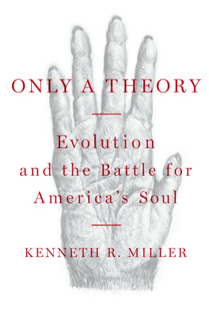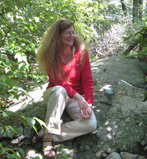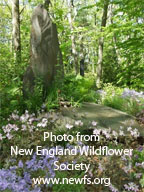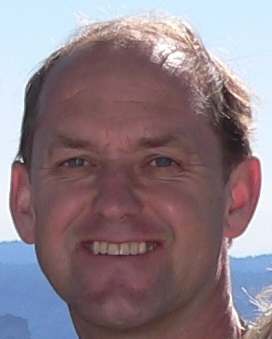Botany
2010 Special Lectures
|
Plenary Lecture
Introducing
Kenneth R. Miller
 Abstract Abstract
Kenneth
R. Miller is Professor of Biology and Royce Family Professor for
Teaching Excellence at Brown University. A cell
biologist, he serves as an advisor on life sciences to the NewsHour,
a daily PBS television program on news and public affairs, and is
a Fellow of the American Association for the Advancement of Science
(AAAS). Miller is coauthor, with Joseph S. Levine, of five different
high school and college biology textbooks used by millions of students
nationwide. In 2005 he served as lead witness in the trial on evolution
and intelligent design in Dover, Pennsylvania. His popular book,
Finding Darwin's God: A Scientist's Search for Common Ground
between God
and Evolution,
addresses the scientific status of evolutionary theory and its relationship
to religious views of nature. His latest
book, Only a Theory: Evolution and the Battle for America's Soul addresses
the continuing struggle over how evolution is to be understood in
American society. His honors include the Presidential Citation
of the American Institute of Biological Science (2005), the Public
Service Award of the American Society for Cell Biology (shared with
Dr. Barbara Forrest in 2006), and the Distinguished Service Award
of the National Association of Biology teachers (2008). In 2009,
Miller was honored with the AAAS Public Understanding of Science
and Technology Award, and with the Gregor Mendel Medal, presented
by Villanova University.
June 16, 2008: The
Colbert Report discusses Only a
Theory
January 12, 2006: The
Colbert Report discusses evolution.

Regional
Botany Lecture
Introducing Elizabeth Farnsworth
Abstract
Elizabeth
Farnsworth is Senior Research Ecologist with the New England
Wild Flower Society (NEWFS),
and a biologist,
educator, and scientific
illustrator. She is currently principal investigator on a National
Science Foundation-funded project to develop an on-line guide
to
the regional flora for teaching botany. She previously coordinated
NEWFS planning for the conservation and management of over 100
species of rare plants. She has illustrated the forthcoming Flora
of New
England for NEWFS and the Natural Communities of New
Hampshire with the NH Natural Heritage Bureau,
and is currently illustrating
The
Ants of New England (Yale University Press). She is co-author
of the Connecticut River Boating Guide: Source to Sea and
the Peterson
Field Guide to the Ferns. She
is a member of the graduate faculties of the University of Massachusetts
at Amherst and the
 University
of Rhode Island,
a Master Teacher at the Conway School of Landscape Design, and
has taught at Smith College and Hampshire College.
She formerly served as Ecologist with the Connecticut Chapter
of
The
Nature Conservancy. She has conducted scientific research on
many ecosystems throughout the world, focusing on restoration,
conservation,
and climate change. She
was awarded a Bullard Research Fellowship by Harvard University
in 2005 and a National Science Foundation
Postdoctoral Fellowship in 1999. She has been a scientific consultant
to the National
Park Service, The Trustees of Reservations, U. S. Forest Service,
Massachusetts and Connecticut Natural Heritage Programs, United
Nations, and the Mount Grace Land Conservation Trust. She obtained
her Ph.D.
in biology from Harvard University, M. Sc. from the University
of Vermont, and a B.A.
with honors in Environmental Studies from Brown University. She
is Editor-in-Chief
of the botanical journal, Rhodora University
of Rhode Island,
a Master Teacher at the Conway School of Landscape Design, and
has taught at Smith College and Hampshire College.
She formerly served as Ecologist with the Connecticut Chapter
of
The
Nature Conservancy. She has conducted scientific research on
many ecosystems throughout the world, focusing on restoration,
conservation,
and climate change. She
was awarded a Bullard Research Fellowship by Harvard University
in 2005 and a National Science Foundation
Postdoctoral Fellowship in 1999. She has been a scientific consultant
to the National
Park Service, The Trustees of Reservations, U. S. Forest Service,
Massachusetts and Connecticut Natural Heritage Programs, United
Nations, and the Mount Grace Land Conservation Trust. She obtained
her Ph.D.
in biology from Harvard University, M. Sc. from the University
of Vermont, and a B.A.
with honors in Environmental Studies from Brown University. She
is Editor-in-Chief
of the botanical journal, Rhodora
 
Annals
of Botany Special Lecture
Introducing
David Ackerly
Abstract
David Ackerly is an Associate
Professor in the Department of Integrative Biology, and the Curator
of Ecology for the UC and
Jepson Herbaria, at the University of California Berkeley. A native
of New England, he conducted his Ph.D. and post-doctoral research
at Harvard University, including field work in Brazil, Mexico,
New England and Japan. Professor Ackerly and his research group
study the ecology and evolution of plant traits – characteristics
such as leaf size and thickness, flowering time, seed size, and
others, that reflect the ecological diversity of terrestrial plants.
Current projects in his lab are examining vernal pools of the Central
Valley, evergreen shrubs in California and Australia, tropical
forests in Ecuador, woody plants in the Sierra Nevada, and potential
impacts of climate change on the endemic flora of the California
Floristic Province. At Berkeley, Professor Ackerly teaches courses
on Ecology, Plant Ecology, Biodiversity, and Plants of the UC Botanical
Garden.
|
|